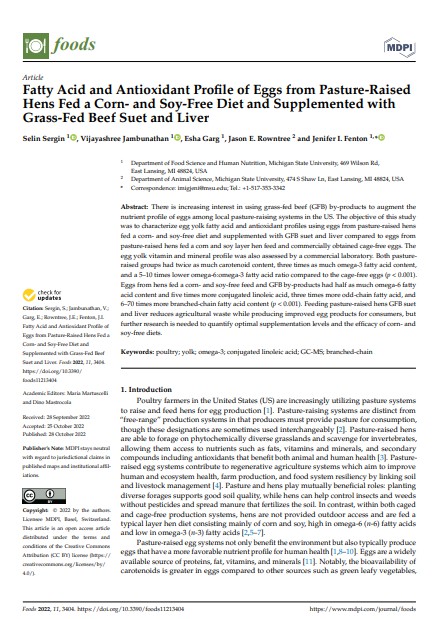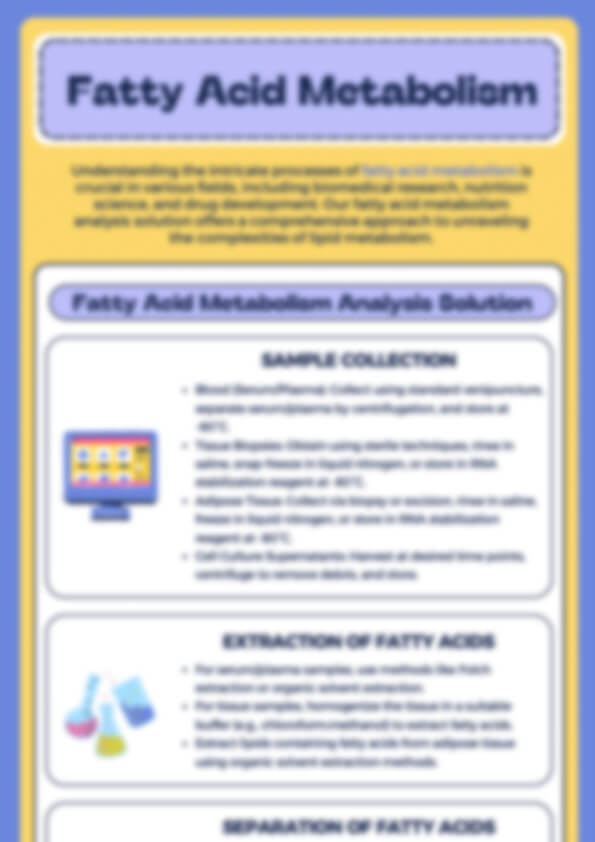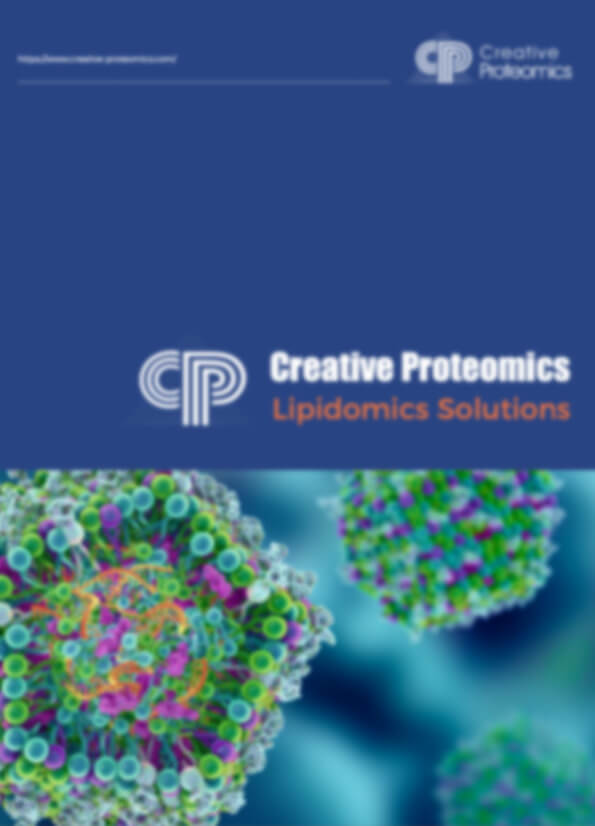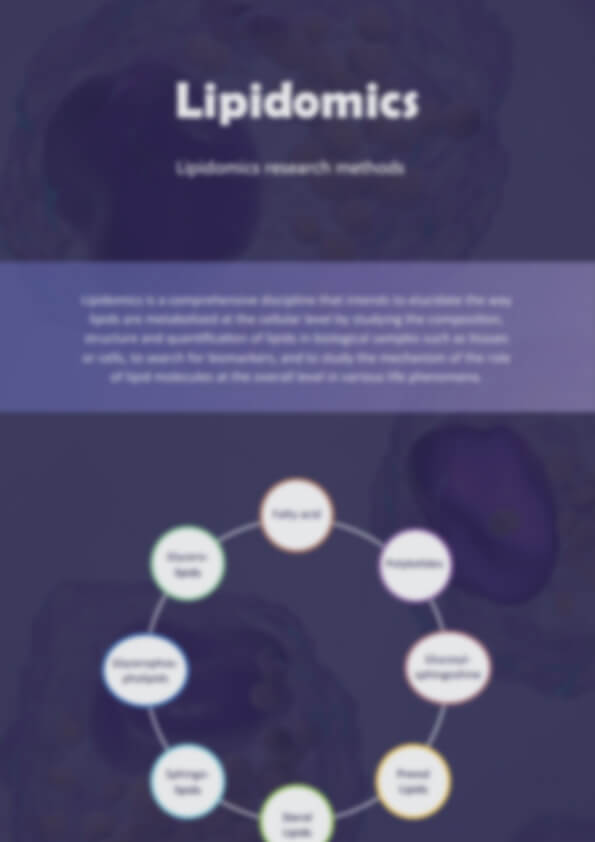Water Soluble Vitamins Analysis Service
Detecting water-soluble vitamins in plasma presents significant challenges, including low sensitivity, poor extraction recovery, instability, and severe matrix interference. A robust, high-throughput method that enables comprehensive and rapid analysis is essential for accurate quantification in clinical and research applications.
To address these challenges, Creative Proteomics has developed an LC-MS/MS-based method for simultaneously measuring 14 water-soluble vitamins and their metabolites in serum and plasma samples. This method offers:
High throughput – Detects all 14 compounds within minutes.
Superior sensitivity – Ensures precise quantification even at low concentrations.
Effective matrix interference separation – Enhances accuracy and reliability.
Submit Your Request Now
×- Introduction
- Methods
- Why LC-MS/MS
- Technical Advantage
- Metabolites list
- Platform
- Sample Requirement
- Demo
- Case Study
- Publication
What Are Water Soluble Vitamins
Water-soluble vitamins (WSVs), encompassing the B-complex vitamins and vitamin C, represent a category of organic compounds essential for sustaining human life. They actively participate in the regulation of physiological processes within the body and serve as crucial bioactive substances for maintaining human health. Within this group, the B-complex vitamins constitute a diverse family, including vitamins B1, B2, B3, B5, B6, B7, B9, B12, among others. These vitamins are collectively characterized by their functional, structural, and physicochemical similarities, all of which contain nitrogen within their chemical structures and exhibit high solubility in water. Primarily functioning in the form of coenzymes, they play pivotal roles in a multitude of intra-body substance synthesis and breakdown metabolic processes, while also maintaining close associations with blood cell formation and energy release. The classification of water-soluble vitamins thus encompasses a range of vital compounds.
| B Vitamin | Description |
|---|---|
| Vitamin B1 (Thiamine) | Also known as thiamine, it plays a crucial role in energy metabolism and may have a role in nerve transmission. |
| Vitamin B2 (Riboflavin) | Also known as riboflavin, it acts as a coenzyme for redox enzymes and participates widely in cellular redox reactions, facilitating the metabolism of fats, sugars, and proteins. It is involved in physical energy and plays a role in vitamin B6 and niacin metabolism. |
| Vitamin B3 (Niacin) | Also known as niacin, nicotinic acid, or vitamin PP, it is involved in lipid metabolism, tissue respiration, and anaerobic carbohydrate breakdown. Niacin is also a component of the glucose tolerance factor. |
| Vitamin B5 (Pantothenic Acid) | Also known as pantothenic acid, it is widely found in animal and plant tissues and participates in the metabolism of carbohydrates, lipids, and proteins, as well as in liver biotransformation processes. |
| Vitamin B6 (Pyridoxine) | Vitamin B6 serves as a coenzyme for various enzymes and can also terminate the action of certain steroid hormones. |
| Vitamin B7 (Biotin) | Also known as biotin or vitamin H, it is essential for fat and carbohydrate metabolism, participates in cell signaling and gene expression, biotinylates proteins, impacting cell cycle, gene transcription, and DNA repair. |
| Vitamin B9 (Folate) | Also known as folate, it is involved in cell growth and division processes, essential for DNA synthesis, red blood cell production, and various amino acid metabolism processes. It plays a vital role in cell proliferation, reproduction, hemoglobin synthesis, fetal development, and may be used to slow down the onset of Alzheimer's disease. |
| Vitamin B12 (Cobalamin) | Also known as cobalamin, it is a vitamin containing a metal element. It is synthesized only by microorganisms and is abundant in yeast and animal livers but absent in plants. It participates in choline and phospholipid biosynthesis and plays a role in nourishing the nervous system. |
| Vitamin C | Description |
| Vitamin C (Ascorbic Acid) | Also known as ascorbic acid, it participates in various hydroxylation and redox reactions in the body and enhances the body's immune response. |

Comparison Of Vitamin Detection Methods
| Technique | Principle | Advantages |
|---|---|---|
| Liquid Chromatography | Quantitative detection based on the unique mass attributes of the analyte. | High sensitivity, high specificity, high throughput, low sample volume; capable of distinguishing between vitamin D2 and D3 types. |
| Tandem Mass Spectrometry (LC-MS/MS) | Internationally recognized as the 'gold standard' for detecting a full spectrum of vitamins; high sensitivity, strong specificity, good accuracy; capable of simultaneously detecting the concentration levels of various vitamins with a single sample, aiding in the precise measurement of vitamin concentration changes in human blood, and assisting in the screening and diagnosis of clinical subhealth conditions. | |
| Immunoassay | Utilizes the principle of antigen-antibody binding at specific target sites. | Risk of cross-reactivity between antigens and antibodies, high false positive and false negative rates; unable to distinguish between different types of vitamin D. |
| Electrochemical Method | Based on the polarization curve of the elution process, reflects the concentration of the analyte. | Low accuracy, poor repeatability, susceptible to interference; unable to distinguish between different types of vitam. |
LC-MS/MS: The Gold Standard for Vitamin Analysis
Several analytical techniques are commonly used for vitamin detection, including capillary electrophoresis (CE), electrochemical analysis, HPLC, and LC-MS/MS. However, many of these methods have significant limitations:
CE and electrochemical analysis – Suffer from inconsistent results and poor linearity.
HPLC – Requires complex derivatization steps and has limited throughput.
In contrast, LC-MS/MS stands out as the gold standard for clinical vitamin analysis due to its:
High sensitivity – Detects vitamins at trace levels.
Superior accuracy – Provides precise and reproducible quantification.
High throughput – Enables simultaneous multi-vitamin analysis in a single run.
Technical Advantages of Our LC-MS/MS Method for Water-Soluble Vitamin Detection
Our LC-MS/MS technology offers unparalleled precision and efficiency for detecting water-soluble vitamins. Key advantages include:
Ultra-High Sensitivity – Detects vitamins at extremely low concentrations (ppt to ppb levels), capturing even minute fluctuations in blood vitamin levels with precision.
Exceptional Specificity – Differentiates structurally similar vitamin isomers and metabolites. For example, LC-MS/MS clearly distinguishes vitamin D2 from D3 and their active metabolites.
Multi-Compound Detection – Simultaneously analyzes 14 water-soluble vitamins or 6 fat-soluble vitamins in just minutes. This reduces sample volume, shortens detection time, and enhances overall efficiency.
Metabolites list
| Water-soluble Vitamins Quantified in Our Service | ||
|---|---|---|
| Vitamin B1 (Thiamine) | Vitamin B2 (Riboflavin) | Vitamin B3 (Niacin) |
| Vitamin B3-amide (Niacinamide) | Vitamin B5 (Pantothenic Acid) | Vitamin B6 (Pyridoxine) |
| Vitamin B7 (Biotin) | Vitamin B9 (Folic acid) | Vitamin B12 (Cobalamins) |
| Vitamin C (Ascorbic Acid) | Vitamin B4 | PA (Pyridoxic Acid) |
| PLP (Pyridoxal 5'-Phosphate) | PL(Pyridoxal) | PM |
| Other Vitamins | ||
| Vitamin-like Compounds | Fat Soluble Vitamins | |
Detection Platform
Ultra-High-Performance Liquid Chromatography Tandem Mass Spectrometry

Agilent 1290-6470 (image source: agilent.com)

Sciex QTRAP 6500+ (image source: Sciex QTRAP 6500+)
Sample Requirements
| Sample type | Recommended sample size |
|---|---|
| Tissue | >200 μL |
| Urine | 200-500 μL |
| Serum/plasma | >100 μL |
| Cerebrospinal fluid, amniotic fluid, bile and other body fluids | >200 μL |
| Suspension cells | >1*107 |
| Walled cells | >1*107 |
| Cell supernatant | >1 mL |
Demo
Case Study: Client Success Stories

Fatty Acid and Antioxidant Profile of Eggs from Pasture-Raised Hens Fed a Corn- and Soy-Free Diet and Supplemented with Grass-Fed Beef Suet and Liver
PMID: 36360017
- Background
- Technical Approach
- Key Findings
Accurately measuring vitamin content and metabolites in food is essential for assessing nutritional value. This study investigates how supplementing pasture-raised hens' diets with grass-fed beef suet and liver impacts the fatty acid and antioxidant profile of their eggs. Researchers leveraged targeted metabolomics to quantify vitamin levels, aiming to understand how dietary modifications enhance egg nutrition.
Using advanced targeted metabolite quantitation, Creative Proteomics provided high-sensitivity vitamin analysis services, enabling precise quantification of multiple vitamins in eggs. In addition to targeted vitamin analysis, the study incorporated fatty acid profiling and antioxidant capacity assessments to comprehensively evaluate how different feed compositions affect egg nutrient content.

Results demonstrated that eggs from hens fed with grass-fed beef suet and liver contained significantly higher levels of key fat-soluble vitamins, including vitamins A, D, and E, compared to those from hens on conventional diets. This indicates that strategic dietary supplementation can enhance egg nutritional quality, offering a healthier option for consumers. Creative Proteomics' targeted metabolomics solutions played a crucial role in accurately quantifying vitamin variations, providing valuable insights for optimizing poultry nutrition strategies.
Our Vitamins Analysis Review

- THE ROLE OF INTRA-TUMORAL MICROBIOME IN MODULATING MUCOSAL-ASSOCIATED INVARIANT T CELL (MAIT) FUNCTION IN LUNG CANCER (Doctoral dissertation, Johns Hopkins University). Yang, X. 2024. https://jscholarship.library.jhu.edu/items/f7b260ea-038e-4719-90e1-0da47a14711c
- Nutritional analysis of commercially available, complete plant-and meat-based dry dog foods in the UK. Brociek, R. A., Li, D., Broughton, R., & Gardner, D. S.. 2024. https://doi.org/10.1101/2024.09.11.612409
- Fatty Acid and Antioxidant Profile of Eggs from Pasture-Raised Hens Fed a Corn- and Soy-Free Diet and Supplemented with Grass-Fed Beef Suet and Liver. Sergin, S., Jambunathan, V., et al. 2022. https://doi.org/10.3390/foods11213404
How to place an order:

*If your organization requires signing of a confidentiality agreement, please contact us by email
With integrated set of separation, characterization, identification and quantification systems featured with excellent robustness & reproducibility, high and ultra-sensitivity, Creative Proteomics provides reliable, rapid and cost-effective water-soluble vitamins targeted metabolomics services.
References
- Jennings, L.; Basiri, R. Amino Acids, B Vitamins, and Choline May Independently and Collaboratively Influence the Incidence and Core Symptoms of Autism Spectrum Disorder. Nutrients 2022, 14, 2896. DOI:10.3390/nu14142896
- Hossain, K.S.; Amarasena, S.; Mayengbam, S. B Vitamins and Their Roles in Gut Health. Microorganisms 2022, 10, 1168. https://doi.org/10.3390/microorganisms10061168












